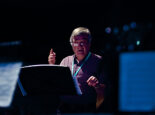Interview: Colin Dexter

Colin Dexter, acclaimed crime writer and creator of Inspector Morse, died in 2017. Back in 2001, Moment editor Toby Venables interviewed him about the (then recent) final Morse novel The Remorseful Day, and how Morse first took shape...
It did not have an auspicious beginning. The very first thing Colin Dexter said to me when I phoned him related to the common mispronunciation of an anglicised Latin term. ‘Of course you know it should be a long “o”?’. I didn’t know. ‘I did do some Latin at primary school,’ I said, weakly. There was a heavy sigh. And suddenly I realised what the situation reminded me of; exactly who I felt like, being at the sharp end of the superior tones so obviously dismayed by my lack of knowledge. I felt like Sergeant Lewis. And the heavy, exasperated sigh seemed to come from Morse himself. ‘Really, Lewis…’
Since the first appearance of curmudgeonly Thames Valley Police detective Inspector Morse in 1975, interest in crime author Colin Dexter has hardly abated. He has occasionally had up to 10 interview related calls in a day. He confesses this is enough ‘to put you on the edge of a nervous breakdown – especially when everybody asks the same questions’. Fortunately, by the day of the interview he has softened somewhat. ‘Perhaps as you’re the first today I shall feel a bit more generously disposed towards you…’
Colin Dexter, it should also be noted, is a Classical scholar, having graduated from Christ’s College, Cambridge in 1953 and subsequently taught the subject at various schools before settling in Oxford. He was a published author long before he turned to fiction. ‘I wrote three school text books with a co-author in the early 60s,’ he says. Then adds, somewhat cryptically, ‘…which were published by a man you’ve heard of from Oxford…’ As it happens, I’ve heard of quite a lot of people, many of them from Oxford. Surely Mr Dexter doesn’t expect me to know the publisher of his school text books? ‘It was Mr Maxwell…’ says Dexter after a long pause.
It seems a natural step for a writer obsessed by crosswords (in fact he is a crossword champion) to construct elaborate crime plots. In fact, the Colin Dexter started to write Morse under the same set of circumstances that might drive the rest of us to tackle the crossword: a wet holiday in North Wales. ‘I was on holiday and there was nothing to do. It was raining outside, and the children weren’t particularly impressed by the choice of weather. And I sat down at the kitchen table one day and started writing a story.’ That story was the first Morse novel, Last Bus To Woodstock. It was 1973. The story was meant to be a one-off. ‘I didn’t do anything to it for six months and then I went back to it and finished it in 74, and it was published in 75. That was the first work of fiction I ever managed.’
It’s quite an achievement for the first work of fiction by a writer – especially a novel – to go straight into print. But Dexter protests this point. ‘It didn’t go straight into print. I sent it to Collins, who were the major crime publishers at that time and they kept it for five months. And then they wrote back and said they didn’t think it was worth publishing…’ He then sent it to Macmillan. The Senior Crime Editor wrote back within 36 hours. ‘He said “We’re going to publish it, warts and all – come and see us.” You strike lucky sometimes – you need a bit of luck in life.’ Most unknown novelists, who feel fortunate in getting their third novel looked at by anybody at all, will think consider him very lucky indeed. There is also the matter of talent, of course. But on this Dexter is reticent. I suggest to him that, had he been somewhat older, he might have been a prime candidate for recruitment to the World War II codebreaking station at Bletchley Park (they especially liked Classics dons, and aptitude with crosswords was considered a good indicator of a potential codebreaker). He nods slowly and counters with: ‘But I also think that had I been very much younger I would never have got into Cambridge anyway. When I was there it was all the boys – 32 to 34 boys colleges and two girls colleges. The odds were 17 to one in favour of the boys. I don’t think I’d have had the opportunity later…’
Of course the other reason for linking Dexter’s name with codes (apart from the highly coded nature of his novels) is the name Morse. But, despite the fact that composer Barrington Pheloung employed Morse Code in the theme tune to the series, according to Dexter the code itself had nothing to do with the naming of the character.
‘No, he was named after one of the cleverest men who would have been in Bletchley Park…’ There’s that long pause again, in which I again panic at my lack of knowledge. ‘That was Sir Jeremy Morse, who was Chairman of Lloyds Bank and one of my crossword competitors.’ He was also President of the International Munetary Fund, Warden of Winchester, Chancellor of Bristol University, Fellow of All Souls… ‘About the cleverest man I ever met,’ says Dexter. ‘I called both Morse and Lewis after the two crossword clue writers I admired more than anyone else.’ But there’s a further twist. ‘Coincidentally, I had been in National Service and had been a high speed Morse code operator. But that was nothing to do with it…’ Coincidence? (Is anything connected with Morse really a coincidence?). ‘Excuse me just one moment,’ says Dexter, ‘I’ve got to turn the soup off.’ Soup? At 10 o’clock in the morning? Who cooks soup at that time? What is he really trying to tell me? Or trying to hide?
For someone who obviously constructed plots with great care and attention to detail, I couldn’t help wondering whether handing the idea over to a TV company had been a cause of trepidation. ‘Good gracious no!’ he laughs, back from his alleged soup. ‘I would’ve given them money to do it! They came up here – producer Kenny McBain, who died tragically young, with director Anthony Minghella – and we met in a pub, the Friar Bacon, which is now demolished. That was the mid 80s.’ The result was the first Morse drama, The Dead Of Jericho, directed by Minghella (who would go on to make Truly Madly Deeply, The English Patient, and The Talented Mr Ripley). ‘The only reason I went on the television was that Kenny McBain had read all the books, and ITV were looking for a new detective. So that was a piece of luck really.’ Dexter is blessed with a great deal of luck. He’s also remarkably pragmatic about the limitations – and changes – that the medium of television imposed upon his creation. ‘They couldn’t find an old Lancia [the car driven by Morse in the original novel] so they got an old Jaguar, and the Jaguar took over. They wanted a younger man for Lewis – in the earlier books Lewis was the same age as Morse. But far more importantly than that, if you are involved in television you know you can’t get people talking together for too long. You don’t give them more than about 30 seconds.’ He’s dismissive about those who question the accuracy of the translation to other media. ‘If someone says “What do you think of the adaptation?” well, it’s not a very good question really. There are things you just can’t do on the telly. What they ought to ask is “Did you enjoy the book,” and “Did you enjoy the telly”. Those are just about the only sensible questions to ask – clearly the adaptations are compelled for various reasons to adopt slightly different approaches, miss out a sub-plot, you know… You’re taking over 400 pages and putting them into a hundred minutes.’
After a dozen novels and 33 television adaptations, Dexter finally laid Morse to rest in The Remorseful Day. In a gesture appropriate to crossword fan, the book in which Morse met his maker was number 13. Did the time naturally come for it to end? ‘I just felt I’d done enough. You lose a bit of freshness if you’re doing a serious character, and it becomes a bit cliché-ridden if you’re not careful. And we killed so many people off. And the characters get older all the time – even Lewis was beginning to look a bit older.’
Inevitably, there was something of a backlash from the public. ‘Everybody tells me what a cruel man I am for killing off Morse. And it’s no good writing back and saying “I didn’t kill him off – he died.” Dexter was very clear he didn’t want Morse to be a victim of shooting, as some had suggested. ‘I mean, it’s not me and it’s not Morse, is it? If you are a diabetic you are much more liable to things like strokes and heart attacks, and if you drink too much and smoke too much and generally refuse to take exercise as Morse used to I don’t think it’s a great surprise that he ended up the way he did.’
Which brings me back to the question ‘How much of Morse is Dexter?’ Is Morse’s end a warning to himself? Dexter loves beer, certainly. But then he is also a family man. ‘I’m not half so mean with money as Morse. But he’s a sensitive soul – poets mean an enormous lot to him as well as Wagner and Mozart. He’s very good at crosswords. But above all a sensitive soul. He’s a bit pessimistic about the future of the universe, but I thought most of us were these days. Unless you’re a genius, which I am not, I think most fiction writers have depend upon some autobiographical insight.’
And suddenly it strikes me. ‘Turn off the soup’. Turn ‘soup’ to get ‘opus’ (Lat. work). ‘Turn off the soup’ = ‘stop the work’. For his own good he simply had to stop. No remorse.
The clues are always there if you look.















